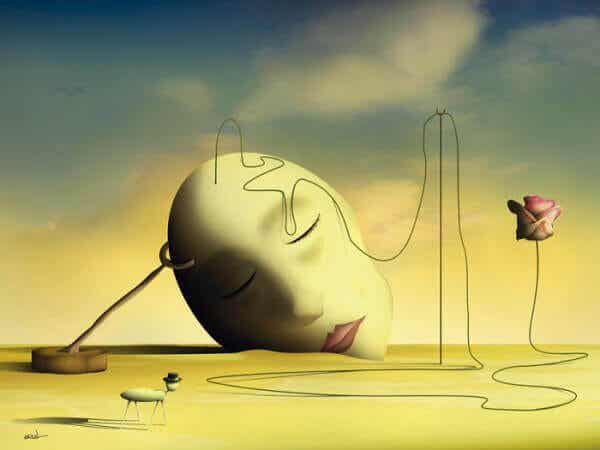
Last update: December 23, 2016
Today we see health and disease as a complex balance that arises from the interaction between body and mind, between organism and thoughts. Little by little we are overcoming the reductive vision that subtracted importance from the influence of the subjective world on the body and, therefore, on illness and healing.
Conventional medicine is gradually becoming aware of its limitations. The twentieth century was marked by a paradigm in which the idea of the body-machine predominated. Seen through this perspective, the organism was like a machine made up of several pieces and the disease was a functional and structural dysfunction of one of these pieces.
However, thanks to the same advances in medicine, it has been possible to ascertain that the internal dimension has a great influence, directly or indirectly, on the state of health of any person. This influence is even more evident when it comes to perceived health. For this reason, it is said that thoughts - with their influence - sick and kill, but they can also heal.
Pharmacological medicine and the medicine of thoughts
Bruce lipton is a PhD in Cell Biology and author of several books. He delved deeply into the subject of health, illness and the influence of thoughts in these processes. His findings and his theories are really interesting.
Lipton points out that pharmacological medicine is practically a disaster. This is due to the fact that chemical medicines, all of them, cause as much adverse effects, if not more, than the symptoms of the disease itself. He assures that many of these drugs, over time, lead to death.
He also stated that the natural environment of cells is blood and that, in turn, changes in the blood are brought about by the nervous system. At the same time, the nervous system is the natural environment of thoughts and feelings.
For this, according to Lipton, it is the thoughts and feelings that ultimately cause illness and, consequently, those that have the potential to aid in the cure.
The power of thoughts on the body
Bruce Lipton is not alone, many other researchers attribute tremendous power to thoughts in the process of disease and cure. Even doctors who are more dedicated to pharmacology know that if someone suffers from an illness, they have a better chance of being cured if they are in a familiar environment, surrounded by affection and trust.
It is not a question of esotericism or an effect that comes from beyond. The explanation of the power of thoughts is also a question of chemistry. When a person is in front of a pleasant presence or is experiencing a positive stimulus, his brain releases dopamine, oxytocin and other substances that restore the cells to health. The same happens when the stimulus is negative, causing fear, anger or other destructive emotions.
The organism does a titanic job every day: to produce one hundred billion new cells to replace those that die, which it must also defend against millions of pathogens that threaten its health. If the body feels that it has to fight against highly negative stimuli every day, it will concentrate all its energy in them and put aside the other functions of growth and protection. The consequences: you will get sick more easily.
Between suggestion and energy
The placebo effect has been studied in various circumstances and the results highlight its influence on our body perception. In fact, several medicines on the market have effects that are only slightly superior to those of a placebo. These placebos are real proof that the influence of thoughts - in this case expectations - can be very powerful: you believe it will cure you and the intensity of the symptoms decreases.
Quantum physics has highlighted the importance of energy, which is the ultimate composition of matter. Everything and all are, in our most primitive physical form, energy. For this reason, the new medical sciences are more oriented towards balancing energy than chemically modifying the body. They start from the idea that disease processes are triggered by energy imbalances.
Those imbalances often stem from negative thoughts that we carry with us since childhood. Perhaps you can consciously convince yourself to think differently and yet something deep inside is preventing you from doing so. Because of this, we must not change conscious thoughts, but all that unconscious programming that has been structured in us since the early years. It is a way of bringing about changes that are conducive to mental health, therefore, physical health.
Editorial note: With this article we do not want to undermine the importance of pharmacology when it comes to dealing with devastating diseases such as cancer, in fact we can say that it is fundamental. Instead, what we want to highlight are mental health and psychological well-being as two elements of influence in the treatment, elements that the patient can manage to improve or worsen the predictions.


























